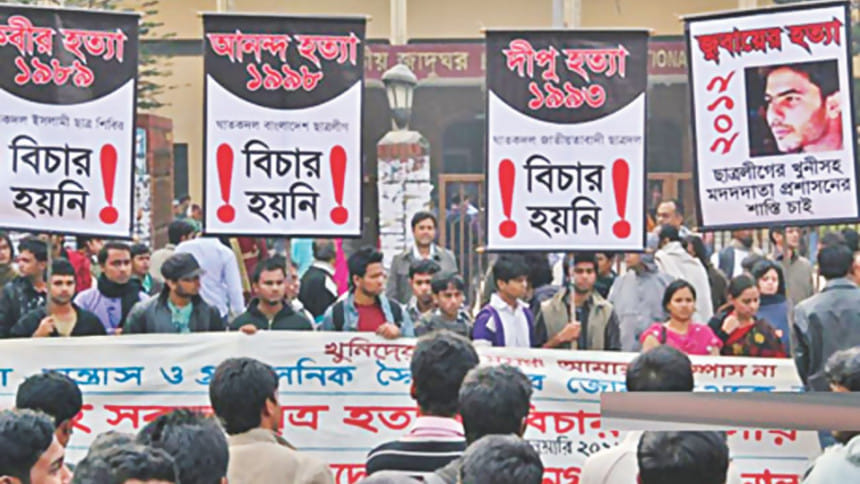Return campuses to KNOWLEDGE SEEKERS

AMIDST the continuing deadly violence in the country unleashed by BNP-Jamaat to unseat the present government, a significant news seems to have lost its importance. A Dhaka court sentenced to death 5 Jahangirnagar University students belonging to Chhatra League, the student wing of AL, for killing Zubair Ahmed, a party mate and a final year student of the same university. Zubair was stabbed to death on January 8, 2012 inside the campus in a factional clash. Besides the 5 sentenced to death, 6 others were sentenced to life imprisonment. The trial was conducted in a Speedy Trial Tribunal, with Judge A.B.M. Nizamul Haque presiding. On December 18, 2013, the same court awarded death penalty to 8 Chhatra League leaders and 5 others for killing a tailor, Bishwajit Das, in old Dhaka on a day of hartal called by BNP. All those sentenced were students of Jagannath University.
The first major fatal student violence took place in 1974 when seven student activists belonging to Chattra League were brutally gunned down in Mohsin Hall of Dhaka University on April 5. Police arrested the then Chhatra League General Secretary Shafiul Alam Pradhan a day after. The learned court found him guilty of masterminding this murder and sentenced him to life imprisonment. After the killing of Bangabandhu on August 15, 1975, Pradhan's punishment was lifted and he was released from prison by General Zia. Pradhan later floated a political party called Jatiya Ganatantrik Party, which is now part of Khaleda Zia-led 20 party alliance.
According to a report published in an English daily on February 10, 64 murders took place in Dhaka University Campus in four decades since independence, but none has ever been brought to justice. The only exception was Shafiul Alam Pradhan. On June 8, 2002, a female student of Buet, Sabekun Nahar Sony, was caught in a crossfire by feuding JCD activists and instantly killed. Amongst those involved in this killing five were convicted, of whom Mushfiquddin, alias Tagar, and his two cohorts are serving life sentences while Nurul Islam Sagor and Mokammel Hayat Khan Muki are on the run.
Besides Dhaka, Jahangirnagar and Jagannath universities, the campuses of Rajshahi and Chittagong universities have over the years turned into killing fields for feuding student organisations. In Rajshahi University even teachers were not spared from the guns and swords of these killers. Islami Chhatra Shibir has gained notoriety for campus violence and they call the shots in campuses of Rajshahi and Chittagong, while the ruling party student wings always dominate in other campuses. Interestingly, except in Chittagong University, the previous ruling party goons change their colour, become members of the current ruling party overnight and often get prized organisational posts, sometimes in exchange for money.
In some universities even some faculty members and local political leaders become patrons of these trouble makers. Incidents of some later becoming faculty members in the same university where they were once campus goons are not rare. Credit must be given to the AL government as it was during its reign that three major convictions, that of Shafiul Alam Pradhan and of the killers of Bishwajit and Zubair, took place.
Many ask why university authorities are not able to punish those found guilty of crimes on campus. It has to be remembered that university authorities are often not equipped with proper facilities to conduct investigations into homicide, arson or vandalism that takes place on campus. Moreover, if there is a prima-facie case and if someone is found guilty, the maximum punishment the university can hand out is expulsion from the university. It is only after a proper police investigation can an offender be convicted under criminal law. Another problem that often makes a university investigation difficult is that credible witnesses seldom testify before an enquiry committee constituting university members. Most of the convictions that take place are based on circumstantial evidence.
Earlier, student feuds usually originated from rivalry for dominance on campus and were confined amongst rival student parties. Now intra-party or factional feuds have become more common. The Zubair murder case of Jahangir Nagar is one such instance. Except those belonging to the Islami Chhatra Shibir, those belonging to other student organisations mostly do not have any political background. They get involved in student politics once they enter the universities and many of them soon become gun- toting campus hoodlums. Chhatra Shibir usually recruit their members early in their student life. They also run innumerable coaching centres across the country and help university admission seeking students in different ways. Many of them are later on forced to join Chhatra Shibir. Amongst all the student organisations, Chhatra Shibir is most organised, resourceful and professional.
Parents send their children to universities to study and not get killed or face the hangman's noose. But some of them unfortunately do. Once, student politics had a glorious record, but with the passage of time that has been completely lost. Today, no good and meritorious student wants to get into student politics. This is a loss for the nation. The trend can be reversed only if the major political parties have proper guidelines for their student wings and see that such guidelines are followed. No words would be enough to console Zubair's parents, and one also has to feel sorry for the parents of those convicted for killing Zubair. Campuses should be returned to knowledge seekers and not left to gun-toting killers.
The writer is a former Vice-chancellor, University of Chittagong. Currently he is teaching at ULAB, Dhaka.

 For all latest news, follow The Daily Star's Google News channel.
For all latest news, follow The Daily Star's Google News channel. 



Comments